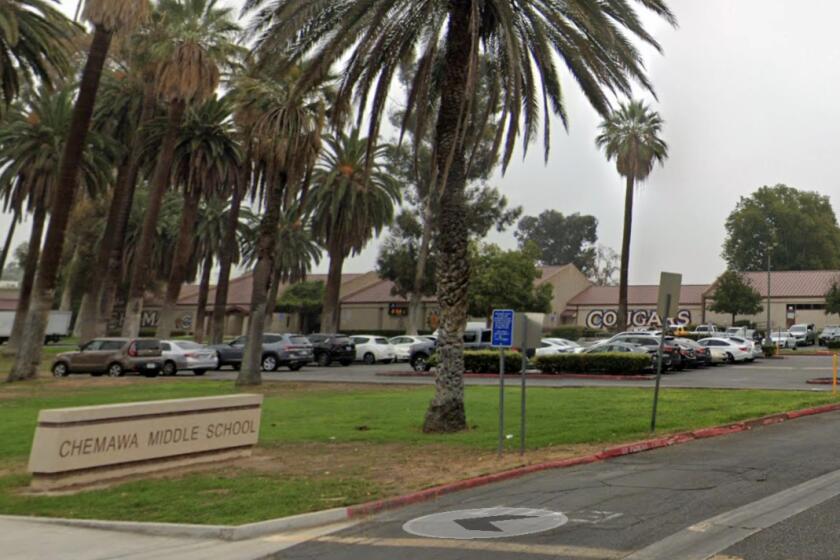Cut your textbook costs
It’s bad enough to pay thousands of dollars a year to send a child to college. But there’s more: Many students and parents don’t realize how much they’ll also have to spend on textbooks.
The cost of textbooks has soared in recent years, and many campuses now estimate that students will spend upward of $1,500 annually on course materials, according to the College Board.
The expense is likely to hit particularly hard those attending low-cost community colleges, where the collective cost of textbooks often exceeds tuition. At Pasadena City College, for example, annual tuition and fees run $652, but the estimated cost for books and supplies is $1,638.
“The textbook market is broken,” said Nicole Allen, textbooks advocate for the Student Public Interest Research Group in Boston. “The fundamental problem is that professors assign the books, often without any knowledge about pricing, and then the ultimate customers of the books have little choice about whether they should buy them.”
That said, there are a vast array of textbook buying options that can dramatically cut the cost. But taking advantage of them takes time and requires organizational skills -- and even at cut rates, buying school books still isn’t cheap.
“You can save hundreds of dollars every semester,” Allen said. “The key is to shop around.”
How can you cut your book costs?
Start with your instructors, Allen suggested. If they’ve already issued book lists, get the so-called ISBN numbers for each book. (These are like Social Security numbers for books, which allow you to make apples-to-apples comparisons while shopping.) Also find out whether the text can be purchased in soft cover or whether you can buy a previous edition.
Although some older editions are too outdated to use, others are nearly identical to the current editions even though some pages may have been moved or updated, Allen said.
If your instructor has been using the same book for some time, he or she may be able to advise you about whether the changes are significant. If the changes aren’t earth-shattering, you can buy an older edition and borrow a book from a well-heeled friend when necessary or study with that person.
How much can that save? If you were to buy the 2008 edition of “Lehninger Principles of Biochemistry,” you would probably pay the $216 retail price at your campus bookstore. But if you could get by with the 2004 edition, you could nab a copy for less than $20 at online retailer Half.com.
If the new edition is too different from the old one to make this a viable option, find out whether there’s a paperback. The biochemistry tome’s 2008 hardback edition sells for $193.63 at Amazon.com, but the soft cover version retails for less than $60.
No dice? Your next step would be to determine whether you intend to keep the book or sell it at the end of the semester. If you don’t plan on saving your books, renting might be a good financial move.
A fledgling company called Chegg.com offers a vast selection of textbooks available for 125-day rental for about a quarter of the retail price. Chegg officials say they can ship books to you in less than three days, so delivery times shouldn’t hamper anyone who thinks even slightly ahead. When you’re done with the class, you send the book back, postage paid -- much like renting movies through Netflix.
The savings vary from book to book. “Exploring Psychology” costs $86 at Amazon but $28 to rent, while two popular biology books are about half the price to rent compared with buying, according to a listing of Chegg’s most commonly rented texts.
When spot-checking Allen’s list of “obscenely expensive” texts, I discovered that “Calculus: Early Transcendentals,” by James Stewart, would cost $214 to buy but just under $60, including shipping, to rent.
There’s no penalty for highlighting or writing in the rented book (assuming you’re not attempting to ruin it), said Jim Safka, Chegg’s co-founder. In fact, “many students consider the highlighting a value added,” he said.
“If a textbook is rendered unrentable, depending on where it is in its life cycle, we might charge the student for overuse,” Safka said. “But 95% of our books come back just fine.”
If you want to keep the book but can’t afford the new-book price, you can always buy used.
In addition to the campus bookstore, there are at least half a dozen websites that sell used books in good condition, including Alibris, TextbooksRus, AbeBooks and Biblio. You can search each of these sites individually, or you can go to www.bigwords.com, which offers one-stop shopping.
In this case, the best price for a lightly used U.S. edition of this calculus book was $122. (An international edition was available for less, but the site warned that the numbers were metric and would not be comparable.)
The one option Allen warned students against buying was e-book versions of texts. A number of publishers offer online books for purchase, she noted, but they are actually one-year rentals. By and large, the e-books are available only through an Internet connection, and many restrict the number of pages you can print at one time.
Worse, you probably won’t save enough on the e-book to make the inconvenience worthwhile. In this case, the calculus e-book cost $100 -- about $40 more than Chegg’s rental and only about $20 less than buying a used hard copy. And, with the e-book, you don’t have anything to resell.
--
kathykristof24@gmail.com



